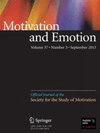Ambitious people are more prone to support resource-intensive aid programs
IF 1.7
3区 心理学
Q3 PSYCHOLOGY, EXPERIMENTAL
引用次数: 0
Abstract
Abstract In line with Significance Quest Theory (SQT, Kruglanski et al., 2022) and Costly Signaling Theory (CST, Zahavi, 1995), the present research aims to investigate the relationship between individual differences in ambition and support for costly (in terms of investment of personal resources) aid programs. Consistent with SQT, which holds that the quest for significance is a universal need that may lead to any type (e.g., violent or prosocial) of extreme behavior in order to satisfy it, we hypothesized that ambitious (vs. less ambitious) people are more motivated to engage in resource-intensive aid programs. In four studies (Total N = 744), both correlational (Studies 1 and 4) and experimental (Studies 2 and 3), we found a significant positive relationship between levels of ambition and support for resource-intensive aid programs; this relationship was mediated by difficulty perceived as important, i.e., the attribution of high value to difficult tasks and goals (Study 4).

雄心勃勃的人更倾向于支持资源密集型的援助项目
摘要本研究根据重要性探索理论(SQT, Kruglanski et al., 2022)和代价信号理论(CST, Zahavi, 1995),旨在探讨个体野心差异与支持代价高昂(以个人资源投入为标准)援助计划之间的关系。SQT认为,对意义的追求是一种普遍的需求,可能导致任何类型的极端行为(例如,暴力或亲社会)来满足它,与此一致,我们假设雄心勃勃(与不那么雄心勃勃)的人更有动力参与资源密集型援助计划。在相关研究(研究1和4)和实验研究(研究2和3)的四项研究(总N = 744)中,我们发现抱负水平与对资源密集型援助计划的支持之间存在显著的正相关关系;这种关系被认为是重要的困难所中介,即对困难任务和目标的高价值归因(研究4)。
本文章由计算机程序翻译,如有差异,请以英文原文为准。
求助全文
约1分钟内获得全文
求助全文
来源期刊

Motivation and Emotion
Multiple-
CiteScore
5.40
自引率
4.20%
发文量
69
期刊介绍:
Motivation and Emotion publishes articles on human motivational and emotional phenomena that make theoretical advances by linking empirical findings to underlying processes. Submissions should focus on key problems in motivation and emotion, and, if using non-human participants, should contribute to theories concerning human behavior. Articles should be explanatory rather than merely descriptive, providing the data necessary to understand the origins of motivation and emotion, to explicate why, how, and under what conditions motivational and emotional states change, and to document that these processes are important to human functioning.A range of methodological approaches are welcome, with methodological rigor as the key criterion. Manuscripts that rely exclusively on self-report data are appropriate, but published articles tend to be those that rely on objective measures (e.g., behavioral observations, psychophysiological responses, reaction times, brain activity, and performance or achievement indicators) either singly or combination with self-report data.The journal generally does not publish scale development and validation articles. However, it is open to articles that focus on the post-validation contribution that a new measure can make. Scale development and validation work therefore may be submitted if it is used as a necessary prerequisite to follow-up studies that demonstrate the importance of the new scale in making a theoretical advance.
 求助内容:
求助内容: 应助结果提醒方式:
应助结果提醒方式:


